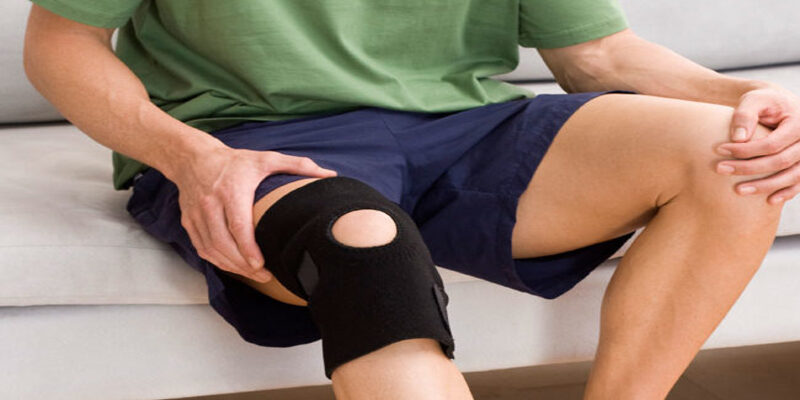Millions of individuals worldwide, especially the elderly, suffer from knee osteoarthritis. The breakdown of the knee's protecting cartilage leads to degenerative joint disease and the associated symptoms of pain, stiffness, and oedema. Knee osteoarthritis is common, and excess weight is a major risk factor. Gaining even a modest amount of weight raises the risk of requiring knee replacement surgery. This major operation can be extremely uncomfortable and take a long time to recover from.
The function of the knee joint is to bear the body's weight while in motion. As a result, the joint will wear down faster if you put greater weight on it. Inflammation brought on by excess weight is another way the joint might be damaged. As an added insult, having extra fat on one's body can cause an uptick in inflammatory hormones, further deteriorating the joint..
Knee Joint And Body Mass
The thigh bone (femur), the shin bone (tibia), and the kneecap form the knee joint, a complicated hinge joint. (patella). Cartilage lines the joint, making it a smooth and slippery surface for the bones to move across. Muscles, tendons, and ligaments all surround the joint, working together to keep it stable and mobile.
The knee's health and performance are greatly affected by one's body weight. When the knee has to support additional weight, the cartilage, ligaments, tendons, and muscles surrounding the joint are put under more strain. Over time, the joint's increasing tension can cause injury and wear, resulting in knee issues like arthritis.
What Happens To The Knee Joint When You Gain Weight

The knee joint is vulnerable to the effects of weight increase. Gaining even a few pounds can strain your joints and speed up the cartilage degeneration that cushions them. When a person puts on just one pound of fat, their knees take on an extra four pounds of pressure every time they take a step. This means that a person who increases 10 pounds of body weight will feel an additional 40 pounds of strain on their knee joint every time they walk.
The premature breakdown of knee cartilage, which can lead to osteoarthritis and other knee issues, might be accelerated by this additional pressure. As a degenerative joint condition, knee osteoarthritis leads to the breakdown and eventual loss of cartilage in that joint. When cartilage in a joint wears down, friction develops between the underlying bones, leading to inflammation, pain, and difficulty moving.
Effects Of Obesity On Knee Replacement
There is a strong correlation between obesity and the need for a knee replacement. Obesity increases a person's likelihood of developing knee osteoarthritis and ultimately having knee replacement surgery, according to several studies. According to one study, there was a 35% increase in the possibility of knee replacement surgery for every 5-point increase in body mass index (BMI).
A higher risk is associated with being overweight since extra pounds can hasten the degeneration of cartilage in the knee, hastening the onset of osteoarthritis and other knee issues. It is possible that, if left untreated, this damage will progress to the point that even conservative treatments like physiotherapy, medicine, and injections will not help. Knee replacement surgery may be the only alternative to ease discomfort and restore mobility.
How To Stop And Treat Knee Osteoarthritis

- Stopping knee osteoarthritis before it starts is the best way to delay the need for a knee replacement. Sticking to a healthy weight is one of the best defenses against developing knee osteoarthritis. The effects of osteoarthritis on the knee can be slowed by losing weight, even if only a small amount.
- Keep your weight where it should be. As was mentioned before, even a slight increase in weight will increase the stress on the knee joint and speed up the wear and tear of the cartilage in that joint. The chance of getting knee osteoarthritis can be lowered by keeping a healthy weight.
- Strengthening the muscles that surround the knee through regular exercise can improve their ability to provide support and protection for the joint. People with knee osteoarthritis can benefit from participating in low-impact workouts, including walking, cycling, and swimming.
- Use the proper equipment when participating in sports or other activities that could cause harm to the knees. Knee pads and sturdy footwear can go a long way toward protecting your knees from damage.
- Put up the effort to do things right: Don't put unnecessary stress on your knees by not using the correct form when carrying large goods. One way to reduce strain on the knee is to use a squat instead of a bending motion.
Conclusion
Avoiding knee osteoarthritis and subsequent surgery might be greatly aided by keeping a healthy weight. The likelihood of needing knee replacement surgery, a major operation that can be painful, expensive, and have a lengthy recovery time, increases with even little weight gain. Maintaining excellent posture, controlling discomfort, engaging in physical therapy, receiving injections, and undergoing surgery if all else fails are all crucial components of a healthy lifestyle. These measures can lessen the likelihood of knee replacement surgery, help people live longer with knee osteoarthritis, and boost their general health and well-being. Knee osteoarthritis is a common problem, but it may be alleviated and healthy joints maintained with only a few simple changes in our daily routines, allowing us to continue enjoying life well into our senior years.




